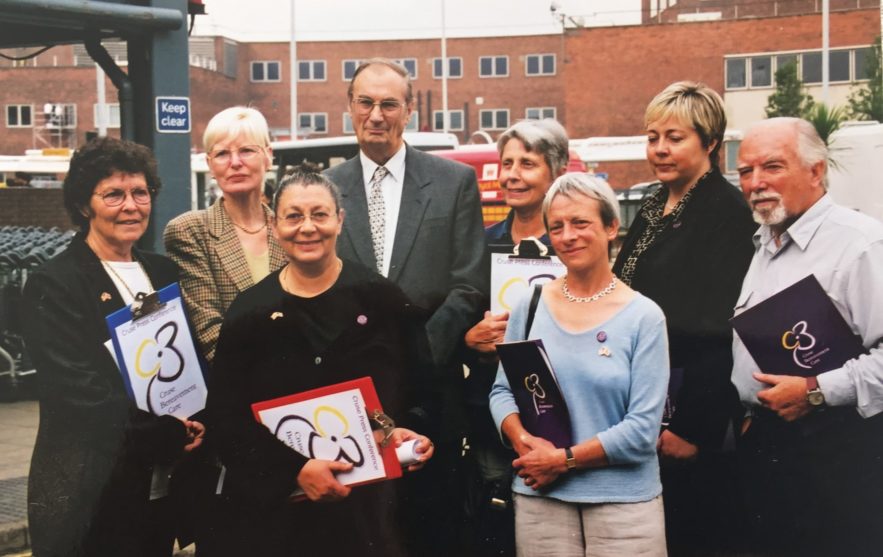Cruse memories of September 11th
Former Cruse CEO Debbie Kerslake was part of the Cruse response team who travelled to New York after 9/11. In this blog she reflects on her experiences and memories.
Where were you on 9/11? Those of us old enough at the time can all remember where we were when we heard the news. I was working at home and a colleague called to say, “put the TV on”. I watched in horror as footage was shown of the plane flying in to the first Tower and then with disbelief as the second Tower was struck, knowing in that moment that this was an act of terrorism.
Cruse first response
I immediately thought of the role we at Cruse would play in the UK. From providing information about the impact of sudden and traumatic death, and extending the hours of the national helpline through to the vital in-person bereavement support over the months and years ahead.
Within 24 hours a national helpline was established working with the British Red Cross and Victim Support. I still remember being asked to take the very first call and trying to focus on what the person was saying while surrounded by press photographers.
What I did not see foresee was that just days later I would be witnessing first-hand the devastation of the attacks and be alongside those whose lives had been torn apart.
Cruse team travels to New York
Two days after 9/11, the Foreign Office asked Cruse to provide volunteers to go to New York. We were to work as part of the team with British Police Family Liaison Officers to support those arriving from the UK whose family members had been in the World Trade Centre when the planes hit. Over seven weeks Cruse placed 16 volunteers in New York, providing practical and emotional support. This included being with families as they gave DNA samples, visiting the Family Assistance Centre (a ‘one stop shop’ of services) and going to Ground Zero – a trip that for many ended any hope that a loved one would be brought out of the wreckage alive.

This ‘emotional first aid’ included being with people who were in shock, spending time as they were waiting for or absorbed bad news and listening as people told their stories. Who was missing? Why were they in the Twin Towers? What did they say in their last call? It was about listening, facilitating the expression of feelings and being alongside in someone’s raw grief. It was about providing reassurance about the feelings being experienced. And it was about giving advice and support, from how to break bad news to children, to strategies for coping, and the help available on returning home. Practical support could be anything from meeting families at the airport and going with them to meet different agencies through to something as simple as getting a cup of tea.
It was about being part of a team and being there for the Police as well, to enable them to share how the experience was impacting on them, to give advice on supporting bereaved families and to be called in to any situation where they felt we could help.
Looking back
Twenty years later, I can still remember so clearly the faces of the children who had seen their father murdered as they watched TV; the pregnant woman whose child would never know their father; the young woman who wanted to share precious photos of the fiancé who she would now never marry; the father getting news that parts of his son’s body had been found; and the firefighters who worked tirelessly combing through the wreckage searching for the bodies and body parts, including of their own colleagues and friends, while grappling with their own personal grief.
- I remember being with thousands of people in their shared grief at the memorial service at Ground Zero. And then being with an individual family at the Urn Ceremony as they were handed a box containing debris from Ground Zero, what might have been the closest thing to ashes they would ever have.
I remember the sight, sounds, and smells of Ground Zero as well as the feelings – the trauma, the despair, the raw grief, the anger and the fear of what next? But I also saw a city and a nation coming together to provide support on a scale never seen before.
- I saw the people of Oklahoma who had themselves experienced a terrorist attack send thousands of teddies as a sign of support.
- I saw a Family Assistance Centre that brought people together to provide everything from legal, housing and immigration advice to financial support. Faith leaders and counsellors were there to talk to, and there were therapy animals to stroke.
- I saw and heard about the simple gestures that made a difference. A man dying of AIDS who went down to the site and saw the faces of the firemen going in and out of the site started cheering and clapping. He saw the effect this had on them, so he carried on doing it. Others joined him so that those firemen felt the support of the community as they went in and out of Ground Zero each day.
And I saw first-hand the skills of the Cruse volunteers who dropped everything to travel across the world and draw on their extensive skills to be alongside bereaved people as they experienced enormous suffering.
As we face the ongoing risk of terrorist attacks, a threat that it is being suggested is heightened following the withdrawal from Afghanistan, it is good to know that 20 years after 9/11 Cruse is still here. Cruse volunteers are ready to be alongside victims at the darkest time in their lives, providing specialist bereavement support in the immediate aftermath as well as in the months and years that follow.
